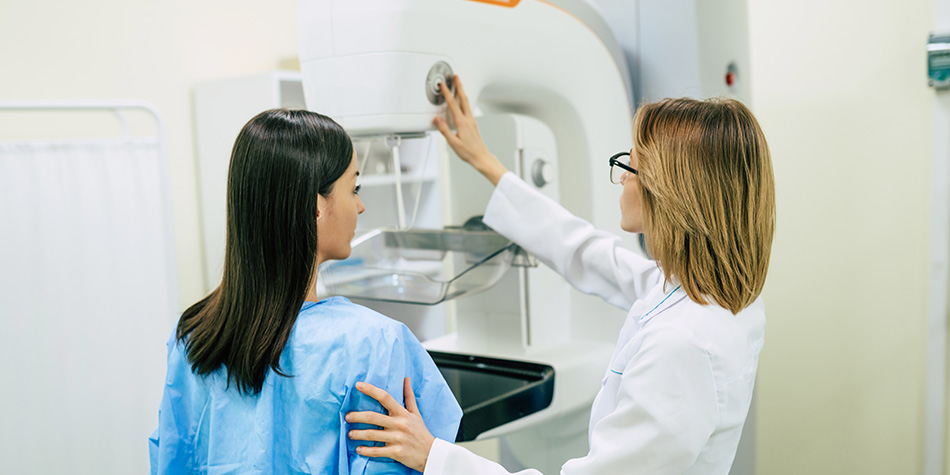
Have questions about what to expect or how to prepare for a mammogram or breast screening? We answer some of your top questions and provide advice about how to prepare for screenings and when to get them.
Many of us know that having a mammogram is a vital step in preventing breast cancer. According to the American Cancer Society, breast cancer is the second most frequently occurring type of cancer in women. Importantly, mammograms cannot determine if you have breast cancer with a single test, and potential cancer will require further examination. But a screening mammogram can help detect early signs of breast cancer, which may allow for more treatment options and improved prognosis.
Below, you can learn what you can expect from a mammogram and other breast screenings, as well as some information about the purposes of those screenings. You can also find the recommended mammogram screening schedule from HCA Healthcare's global cancer institute, Sarah Cannon. You will also see information about preparing for your mammogram, information on genetic testing and answers to commonly asked questions about mammograms.
Prepare for your mammogram appointment
Dress for comfort. Depending on the type of mammogram, you may only need to remove your top. If you are having a mammogram, avoid wearing deodorant, perfume or powder. However, if you forget, many centers provide cleansing cloths for this purpose.
Types of breast screenings
- Mammogram: The American Cancer Society recommends women with an average risk of breast cancer consider having a mammogram starting around age 40. When you have your mammogram, each of your breasts will be scanned one at a time. You can expect to stand in front of a mammography unit while a technologist uncovers the breast you are having scanned. They will then place it on a clear plastic plate. A second plate then lowers until your breast is pressed between the two plastic plates. Images are taken from the front and the side. Tip: If your breasts are tender or swollen due to your menstrual cycle, consider rescheduling your mammogram to the week following your menstrual cycle.
- Breast magnetic resonance imaging (breast MRI): This imaging test might be recommended if you have a high risk of breast cancer. It may also be a breast cancer staging tool, or used to identify lesions if you have already been diagnosed with breast cancer. The breast MRI creates three-dimensional, detailed images of your breast using a magnet connected to a computer. Sometimes the doctor may order a breast MRI with contrast, meaning that a contrast dye will be injected into your body through an IV. Tip: Even if you are at higher risk, you still need to have regular mammograms in addition to any other recommended screening tests.
- Breast ultrasound: If you or your doctor have discovered lumps or abnormalities during a breast self-exam, clinical breast exam or mammogram, this exam may be recommended. It involves bouncing sound waves off your breast tissue to create a picture called a sonogram. You'll lie down on a table, raise your hands above your head and have a water-based gel applied to the area. Then, the radiologist or sonographer will run the transducer over your breast. Tip: A breast ultrasound does not replace regular mammograms.
Recommended mammogram screening schedule
Both Sarah Cannon and the American Cancer Society recommend annual mammograms for women over 40 who have average risks of developing breast cancer. But it is also recommended that women talk to their doctors about their risks for breast cancer as early as age 25 about their individualized risk for breast cancer, as higher-risk women may benefit from genetic counseling or early screening. Keep in mind that all patients are different, so your individual screening schedule may differ.
What factors make someone high risk for breast cancer?
At this point, you may be wondering whether you or someone you know are at high risk for breast cancer. Here are some key indicators to look out for:
- Prior personal history of breast cancer, or other abnormalities in the breast tissue
- A high proportion of dense breast tissue instead of fatty tissue
- Previous breast exposure to radiation therapy before age 30
- Pregnancy after age 30, or no pregnancy at all
- Absence of breastfeeding
- Obesity or being overweight, particularly after menopause
- Increased exposure to estrogen, first period before age 13, menopause after age 51, prolonged hormone replacement therapy
- Previous biopsy results that indicate atypical hyperplasia, lobular carcinoma in situ, or radial scar formation
Mammogram Q&As
Below are some other questions you may have about mammograms and breast screenings, answered by our experts.
I'm pregnant or breastfeeding and due for a test. Should I wait?
If you are pregnant, you should not undergo a mammogram because of possible danger to the fetus. If your gynecologist or obstetrician feels it is important to have a breast screening test during your pregnancy, a breast ultrasound will be ordered. Below are some other questions you may have about mammograms and breast screenings, answered by our experts.
If you are breastfeeding, your tissues may appear more dense than usual, making it harder for the radiologist to interpret the results.
I have a breast implants. Can I still get a mammogram?
While it is safe to have a mammogram when you have a breast implant, be sure to tell the technologist before the procedure since the machine may require special adjustment for the best possible images.
What else should I know?
You should always receive the results of your mammogram. If there are any abnormalities, your doctor may refer you to a breast specialist or a surgeon for more tests or evaluations. If the results are normal, continue to follow your recommended schedule for the next mammogram.
If you have additional questions about breast cancer, we can help. askSARAH is a dedicated, confidential helpline for your cancer-related questions. Our specially trained nurses are available 24/7. Call askSARAH at (804) 591-4152.